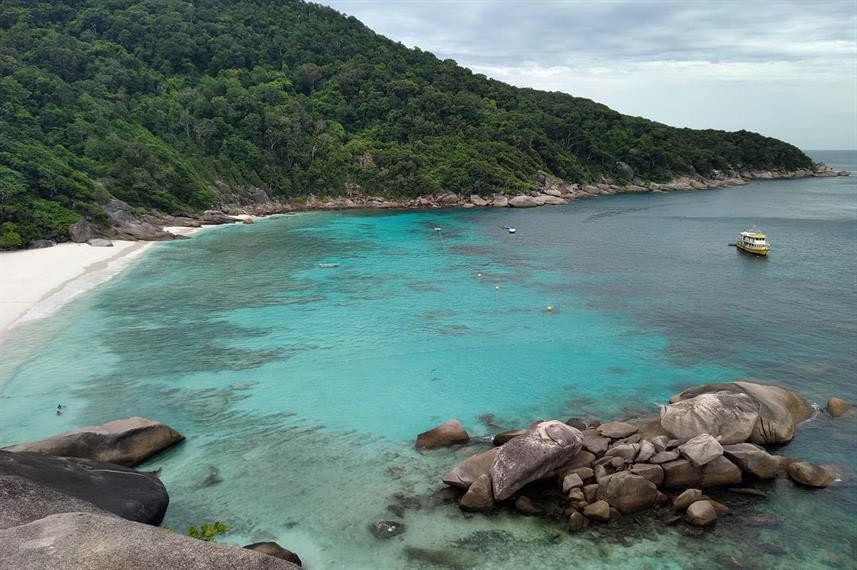Thai drivers are working together off the shores of Phuket to put an end to “ghost gear”: discarded or lost fishing gear polluting the ocean that threatens to entangle, trap, and kill marine life. As most ghost gear is made of plastic, it’s also a big contributor to microplastic pollution (fishing nets and ropes break down over time and release microplastics into the sea). Around 30% of endangered marine life are now impacted by plastic pollution in Thailand’s upper Andaman Sea, up from 20% in 2021, Thailand’s Department of Marine and Coastal Resources reveals.
Fighting for trash-free seas
Around twenty volunteer divers are taking part in the clean-up mission, each of them fitted with submersible gear and equipped with scissors and nets. Once the ocean trash is collected and brought to shore, it’s sorted, weighed, and sent to recycling sites where possible. In one tragic, but sadly not-rare case, a dead turtle was discovered by the volunteers on the shore, and sent to marine veterinarians for a necropsy. Its stomach was found full of pieces of rope and plastic.
The Environmental Justice Foundation (EJF) has so far successfully collected around 130 tons of old fishing gear from local fishing communities along the Thai coast, and recycled this would-be trash into new and usable products. And anyone (as long as they’re a qualified diver) can join in and help with their efforts. The group welcomes other recreational divers to participate in the clean-up, while they’ve also contacted roughly 500 local fishermen to collect abandoned nets.
The problem of plastic waste
“As of today, plastic waste is one of the main causes of endangered marine animals washing ashore,” said Patcharaporn Kaewmong, head of Phuket’s marine rescue centre. “Waste management is a very big problem”. Indeed, Thailand is the sixth-biggest contributor towards ocean plastic waste globally, according to Greenpeace’s “Plastic Waste Inputs From Land Into the Ocean” report. Just last year, three tonnes of plastic waste was removed from Phuket’s beaches alone by volunteer groups.
Elsewhere, in Pattaya, a lively city on Thailand’s eastern Gulf coast, ocean clean-up efforts have ramped up in recent years and the water near the coast is generally safe for swimming. In fact, Pattaya is somewhat of a diving paradise with no shortage of excellent dive spots. There’s plenty of wrecks to explore, with the nearest one being around forty minutes from shore. September through to February is the best window for diving here in terms of visibility. During this time, the water is calm and clear enough for divers to see the wrecks in perfect detail. On top of excellent diving, Pattaya also offers great food, affordable housing, and varied nightlife, which means it’s a popular destination for expats looking to improve their quality of life.
A strategic approach to ocean clean-up
The current clean-up mission in Phuket also aims to help marine scientists study exactly how ghost gear is affecting the Thai ocean and marine life. The volunteer divers are therefore diving down with notebooks, so they can also record valuable data while they collect trash. Although scuba diving groups and marine organisations across Thailand have been committed to hosting ocean clean-up events to remove abandoned fishing gear and plastic from the waters for a number of years now, it’s not really clear how much progress has so far been made. A well-organised, cohesive approach is now needed in order to develop solutions that effectively monitor, manage, and prohibit the dumping of fishing equipment.
“We constantly collect discarded fishing gear. We have a strong scuba diving community. We have many government sectors working on this cleanup drive,” said Salisa Traipipitsiriwat, senior campaigner and Southeast Asian plastic manager at the EJF. “Even though there is collection of waste, there is no uniform data collection,” Salisa also noted. The EJF is working with other organisations to launch a uniform data collection system.
Plastic waste and ghost gear is a serious problem that threatens marine ecosystems around the world. Fortunately, the current efforts being made by Thai divers in Phuket are playing a significant role in creating clean, safe, and healthy beaches and oceans for all.







